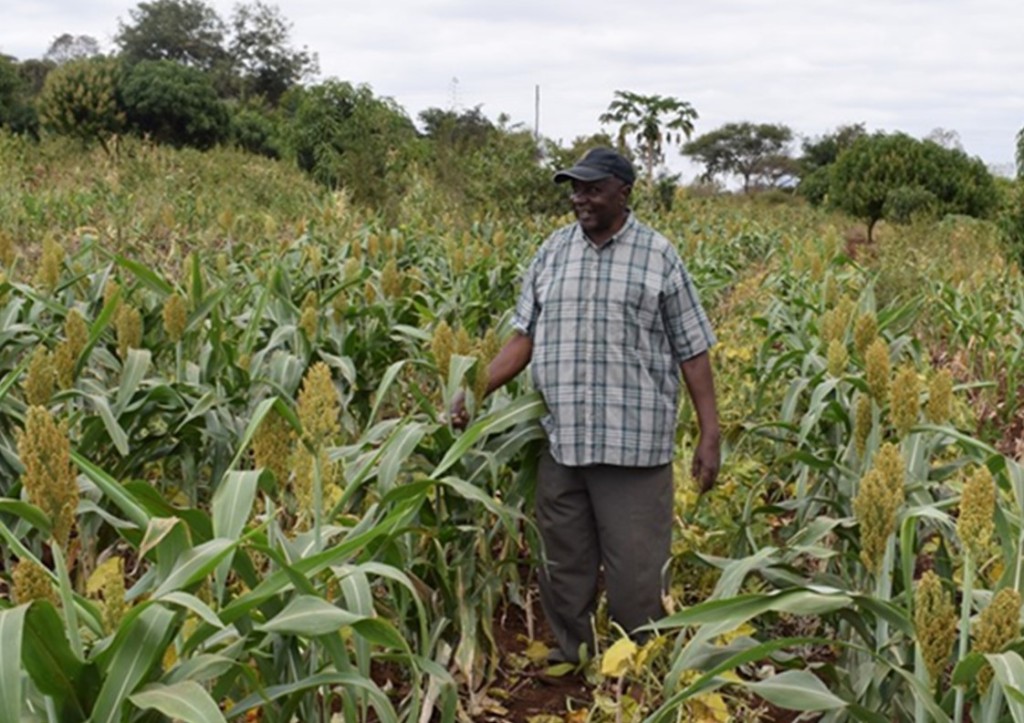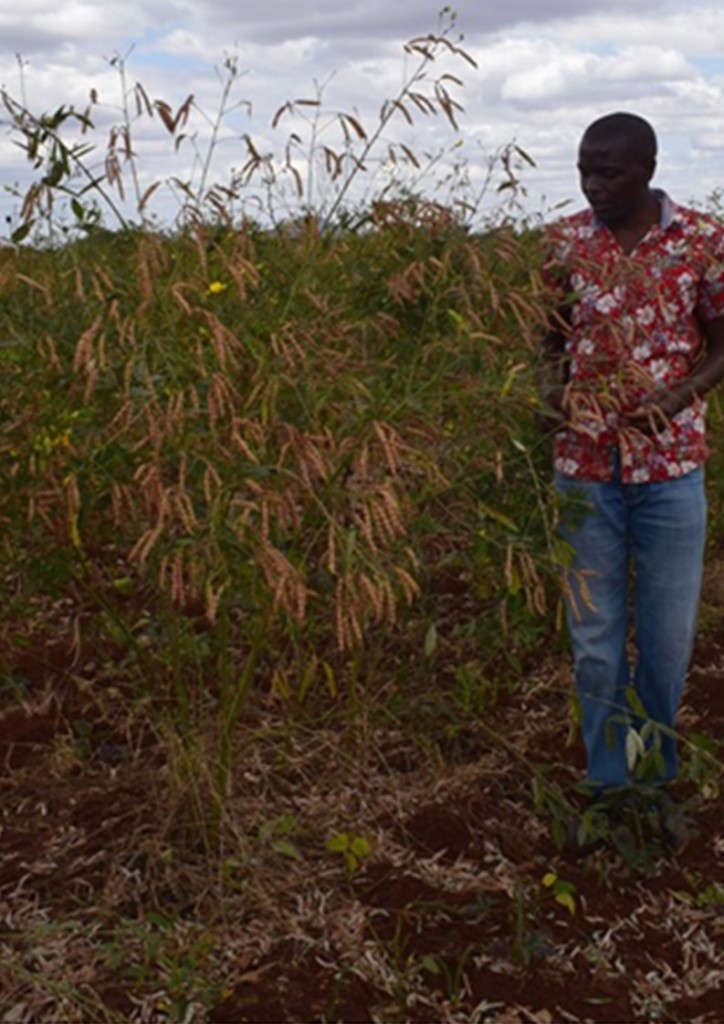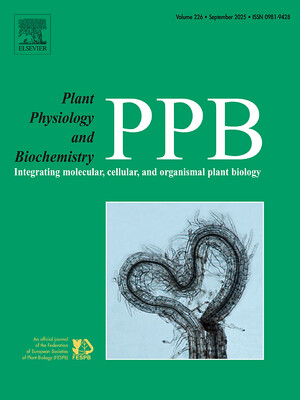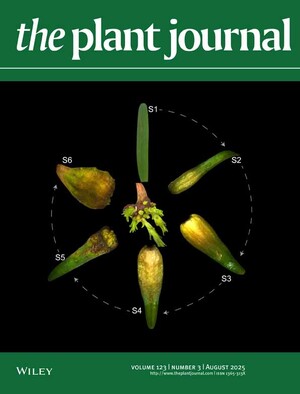
New drought-tolerant varieties rekindle hopes of food security in drought-prone Makueni County

A happy and hopeful Wilson Lati at his drought-tolerant Sorghum farm in Emali/Mulala Ward in Makueni
Hoping against hope of decent harvests, farmers in the semi-arid and arid regions of eastern Kenya have always planted their traditional and favourite food crops – pigeonpea, green gram, sorghum, pearl millet, finger millet, cowpea, and maize – at the onset of long or short rains. But it is a ritual that has been driven by impulse. For year in year out, the farmers have suffered major crop losses due to the prevailing harsh environments – high temperatures, low and erratic rainfall, and unrelenting prolonged droughts compounded by pests and diseases. The consequences have been grave: food and nutrition insecurity leading to hunger and starvation, only minimally ameliorated with sporadic distribution of relief food.
But this despair is steadily turning into hope for farmers in Makueni County. In 2019, the United States Agency for International Development/Feed the Future funded Accelerated Value Chain Development Program (AVCD), through the International Crops Research Institute for the Semi-Arid Tropics (ICRISAT) and Egerton University Seed Unit introduced drought tolerant and high yielding varieties of pigeonpea (Egerton Mbaazi 1, Egerton Mbaazi 3 and Egerton Mbaazi 4), sorghum (EUS1 and Gadam) and green grams (Karembo and Biashara). These varieties have proved a fundamental fact: while the harsh environment is a major factor in crop failure, unavailability of improved varieties that can withstand or escape drought, that are disease-resistant and their respective certified seed have been the main and even bigger problems to agricultural productivity in the arid and semi-arid lands (ASALs).
It is a fact John Ndiso, a farmer in Emali/Mulala Ward in Makueni County, is happily and gratefully coming to terms with after planting for the first time, Egerton Mbaazi 3. Ndiso’s farm is a complete contrast of his neighbours and other farms in Makueni that are dotted with withered traditional cereal crops and total maize failures in most farms due to minimal and poorly distributed March-May rainfall.
The crop – that is performing extremely well – is a complete contrast of the traditional varieties, exhibiting all the great attributes desired by farmers: early maturing having taken only 6 months compared to the traditional varieties that take a whole year to mature. In addition to being drought tolerant, their early maturing trait also helps the variety to easily escape drought. For instance, those planted in November 2020 flowered in early March this year, when they needed water most and consequently escaped the effects of drought that has been ravaging the region since May while the traditional varieties started flowing in mid-June. It is also resistant to fusarium wilt. More desired by the farmers is the variety can be harvested three times in a year.
‘It is the first time in my 35 years of growing pigeonpea and green gram that I have seen a crop thriving even in the hardest of weather conditions,’ states the 62 years.

Peter Kisulu admiring his robust drought-tolerant and high yielding Egerton Mbaazi 1
Ndiso has already started reaping the benefits of planting this early maturing and high yielding pigeonpea and green gram. ‘I had my first harvest of 1 tonne of pigeonpea. I am about to start the second harvesting. By the time I am through with the third harvest, I will have about 3 – 4 tonnes of seed from the crop.’
For Peter Kisilu who has been growing maize, beans, green gram and pigeonpea over the last 7
years, planting Egerton Mbaazi 1 has injected a new source of inspiration, vigour and passion for farming. ‘I have benefitted from trainings on good agricultural practices that have rekindled my hopes of a bright future in farming,’ states the youthful Kisilu.
He is very impressed with the variety for its early maturity, high yielding, continuous flowering and podding, and the relatively low investment costs. ‘I am expecting not less 400 kg from the crop which I will sell to Egerton Seed Unit at 100 shillings per kg as per the contract I have with them. I only invested 17,000 shillings.’
The trend is seen across the County where farmers have planted improved drought tolerant crop varieties such as Stephen Kataa from Itaa sub Location, Wote Disvision, who planted the improved Karembo green gram variety on 0.25 acres in mid-April for the first time. He has already bagged 60 kg that he hopes to sell at 150 shillings per kg. He is looking forward to getting a decent harvest from his drought tolerant sorghum crop that is doing well under the harsh weather conditions.
Establishing a robust seed system
As they say, seeing is believing. Those farmers who have had a chance to see Ndiso and Kisilu’s robust crops are not only yearning for the seed, they have spread the word about the high yielding crops, generating very high demand for seed of the new improved drought tolerant varieties.
Aware of the constraints to access improved and certified seed – a major limiting factor to agricultural productivity – AVCD worked with partners to establish robust seed systems through formal and farmer-based organizations that would ensure steady production and timely supply of seed of the improved varieties to meet ever growing demand and develop farming value chains into profitable businesses.
The Makueni County Government has developed an Agricultural County Strategy that recognizes both the formal and informal seed systems and will promote both of them as it sees them as complimentary rather than competing. This is premised on the fact that there is a huge gap in seed demand and supply that cannot be filled by the formal seed system alone. In any case, come planting season, farmers will plant with or without certified seed. It is important that the farmers have access to certified seed whether from informal or formal seed systems, according to Mary Muteti, Makueni County director of agriculture.
‘There is a huge shortage of seed of improved pigeonpea varieties in Makueni. Being a traditional crop, and a major ingredient of all food preparations in the region, virtually every farmer grows pigeonpea in Makueni,’ states Muteti. ‘The County has 32,000 acres under green grams. We need about 120 tonnes of seed to satisfy demand. This cannot be supplied by the formal seed system alone. We need to strengthen the informal seed system to satisfy this demand.’
AVCD helped to establish and strengthen Makueni Agribusiness Ventures Farmers Group – a farmer producer organization that has been supported through trainings and other capacity development initiatives to produce certified pigeonpea seed.
Under the partnership, Egerton University commercially releases the varieties bred by ICRISAT, contracts farmers through the Egerton University Seed Unit/Agrisoy Seed Company, the private wing of Egerton University and conducts backstopping on training and release of varieties. The Seed Unit has already contracted Makueni Agribusiness Ventures Farmers Group – an 11-member group that was formed in 2019 – to produce pigeonpea seeds. In 2020, the group committed 42 acres under production of improved drought tolerant pigeonpea varieties. The seed production has already been approved and certified by KEPHIS. It is expecting to supply at least 17 metric tonnes of certified pigeonpea seed this year.
The community seed producers will be contracted until there is sufficient seed of improved varieties of pigeonpea, according to Mr Bernard Towett, coordinator, Agrosoy/Egerton University Seed Unit.


















